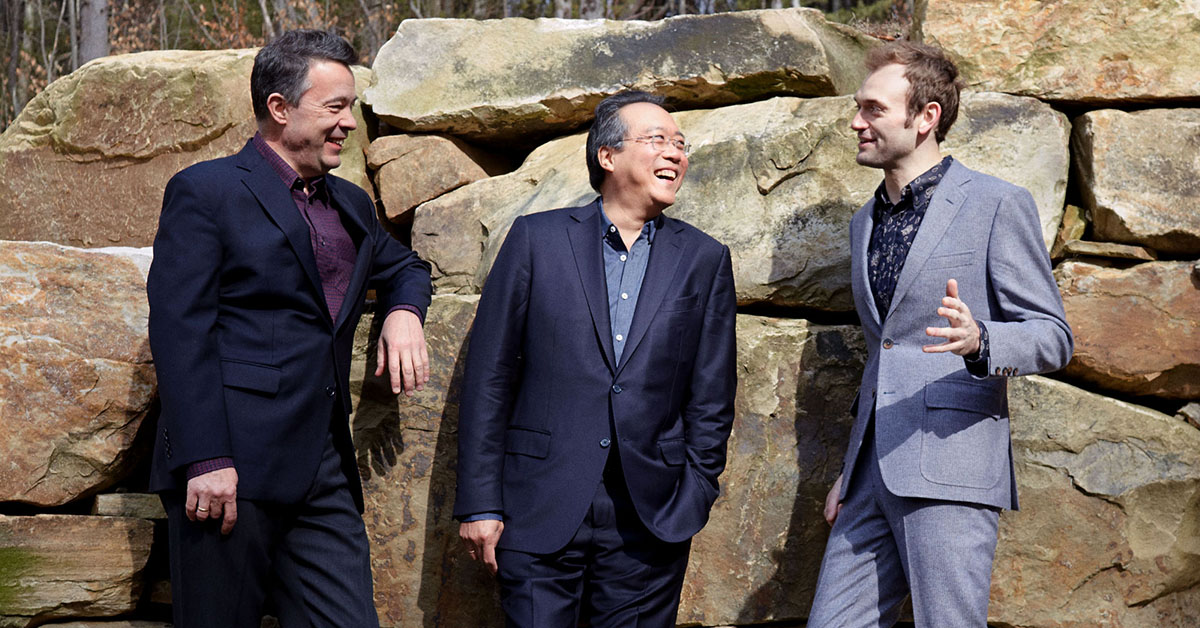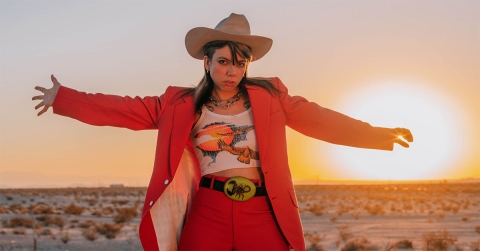Cellist Yo-Yo Ma, mandolinist Chris Thile, and bassist Edgar Meyer released Bach Trios, an album of Bach works originally written for keyboard instruments, on CD and digitally last Friday, with the vinyl due April 21. Here, the artists speak with writer Michael Hill about the project and how it came to be.
Yo-Yo Ma, Chris Thile, and Edgar Meyer have for years been musical fellow travelers and friends—brilliant, like-minded performers who have converged in the studio and on stage for several extraordinary projects. The work of Johann Sebastian Bach has often been at the heart of their ongoing artistic discourse. In March of 2016, the trio returned to the James Taylor's Berkshires studio, the site where violinist Stuart Duncan joined them to record the Grammy Award–winning The Goat Rodeo Sessions, to record the new album Bach Trios.
"The love of Bach is so central to the three of us that it is surprisingly difficult to explain," says double bassist Meyer. "It can be a shared experience, with so many pieces that we all know and have played. It can be a common dialect, from which we reference all other music. It certainly is a standard of beauty and logic that inspires for a lifetime."
Cellist Yo-Yo Ma echoes that latter sentiment: "Bach's music has the capacity to be infinitely empathetic to the human condition while at the same time being completely objective. It is because of this dichotomy that I have played the same music both for weddings and for memorials."
In 2013, mandolinist Thile released Bach: Sonatas and Partitas, Vol. 1, a solo disc for Nonesuch recorded at Taylor's barn studio and produced by Meyer. The New Yorker's Alec Wilkinson said of that album, "You have the feeling of someone trying as hard as he can to live inside the music and to breathe with it. His elaborate and often stunning playing is laced with sadness but also with a wild, delirious pleasure, a piercing happiness, even a joy."
Returning to the barn to record Bach Trios, Thile explains, "There is a religious aspect to working on Bach. It's sacred. Spending time with Bach gives any serious musician a sense of being in the presence of something higher. He's kind of a god-like figure in the music community. All arguments about who's the greatest musician start after Bach."
In his liner notes essay for Bach Trios, the composer and pianist Timo Andres admits "mandolin, cello, and double bass are, at face value, an unlikely instrumental combination, but this is an obviously harmonious set of personalities and musical predilections. There is a huge range of possibility in Bach interpretation, from the revisionist, almost authorial approach to the scholarly and historically informed. There's much to be gained from both schools, and, wisely, the Thile/Ma/Meyer trio finds its voice somewhere in the middle of the spectrum. Here, drawn in by the directness of the music itself, it's entirely possible to lose oneself for long stretches, just listening."
"It's the sound," Ma enthuses. "Mandolin, bass, and cello is unique, unusual, and extremely pleasing! Each voice is clear, with real independence in the lines, and the blend really works."
"Our instinct in looking for appropriate pieces," continues Meyer, "was to primarily look to pieces that were conceived in three voices, although often not for three instruments. In fact, I don't think that any of these pieces were written for three instruments. The instrumentation is unspecified for the Art of the Fugue, although the vast majority of it can be performed by two hands at one keyboard, which is not true of many of Bach's ensemble fugues. Additionally, we wanted to take a little advantage of Chris's polyphonic capability, either for playing accompanying chords on guitar, or for taking on the E Minor Prelude and Fugue that is often in more than three voices. In general the pieces are not arranged, but are chosen in such a way that we can play them without altering any notes."
Thile was still in his teens when he sought out the tutelage of Meyer in Nashville. As Thile recalls, "I was so hungry to learn more about the nuts and bolt of music—why do I like this? What binds all these great pieces of music together? I felt the connection but couldn't quite express it. Edgar and I started having these long sessions at his place. I'd show him things I was working on, he'd show me things he was working on, then we'd talk about it all. Up to that point, I'd been relying heavily on intuition. Edgar helped me dig into the learned side of music, and Bach was at the center of it. Very early on, Edgar played me Yo-Yo's Bach recordings. Yo-Yo's whole approach to music is warm, inclusive—he's collaborating with everyone all the time. If he's playing solo, he's collaborating with you, the listener. That's one of the most powerful aspects of his musicianship. Yo-Yo loves music and he loves people. And that runs through every note he plays."
The New Yorker has called Meyer "the most remarkable virtuoso in the relatively unchronicled history of his instrument." Meyer first collaborated with Ma in 1996, along with fiddler Mark O'Connor, on Appalachia Waltz, an album combining traditional folk tunes with original compositions that reached the top of the classical charts. Four years later, Appalachian Journey garnered a Grammy Award for Best Classical Crossover album. Thile first joined Ma and Meyer in the studio for the 2008 holiday release of Songs of Joy and Peace, and it was the start of a significant creative and personal relationship among the three of them. Thile remembers, "Yo-Yo, Edgar, and I went to a sushi place afterwards, ate more sushi than I thought was possible, closed the place down, and then stood outside on the sidewalk for maybe two hours, talking about everything: music, life, parents, Bach. After that night, I felt pretty certain that the three of us would keep finding ways to make music together."
In 2008, Meyer and Thile also released their first duo album, Edgar Meyer & Chris Thile, on Nonesuch. In 2015, they won a Best Contemporary Instrumental Album Grammy for Bass & Mandolin, their follow-up disc. The Goat Rodeo Sessions, released in 2011, became a phenomenal across-the-board success, topping the classical, classical crossover, and bluegrass charts and reaching #23 on the pop charts. The album won Grammys for Best Folk Album and Best Engineered Album, Non Classical.
Goat Rodeo producer Steven Epstein returned to helm Bach Trios at the barn, where, in Thile's opinion, "there is a wonderful middle ground" between tracking in a traditional studio environment and recording in a concert hall setting. "The barn gives equal love to the bowed and the plucked instruments." During the editing process, they tried to capture the exuberance of the playing. "Edgar and I in particular are so persnickety when it comes to this stuff, but we were both comfortable loosening our grip and just letting it rip. The freedom that comes with that is invaluable."
Ma, Meyer, and Thile each have long and varied discographies, reflecting their broad musical interests and their love of collaboration and experimentation. Thile and Meyer have both been recipients of the prestigious MacArthur Foundation "Genius" Award; Ma and Meyer have each been awarded the Avery Fisher Prize, with Meyer being the first bassist to receive that recognition. Among many other accolades, Ma was recognized a Kennedy Center Honoree (2011) and has been awarded the National Medal of Arts and the Presidential Medal of Freedom.
Interviewed for the Creative Midlife series in the New York Times, Ma said, "I've come to think of music in a way that's a little clearer now. I would say the sound part of it, what you hear, the measurable part of the sound, is equivalent to the tip of an iceberg, less than ten percent of the whole mass. So what's below the surface is actually what is the music, what's above is just the sound. I think about what is behind Bob Dylan's voice. What is infusing Chris Thile's sound, what is going on in his brain when he plays the mandolin? You can analyze the music and replicate it but you're not really getting to Chris Thile until you understand what his worldview is, what motivates him to be open to everything around him, to be obsessive about slight differences in the taste of coffee."
Bach Trios is the beautiful, visible ten percent of the deep relationship among these artists. Of his collaborators, Ma says, "They are special human beings who also happen to be great, versatile, open, and curious musicians."
—Michael Hill
- Log in to post comments




Have you heard of Zelenka..
Have you heard of Zelenka...sometimes described as Bach on steroids :g